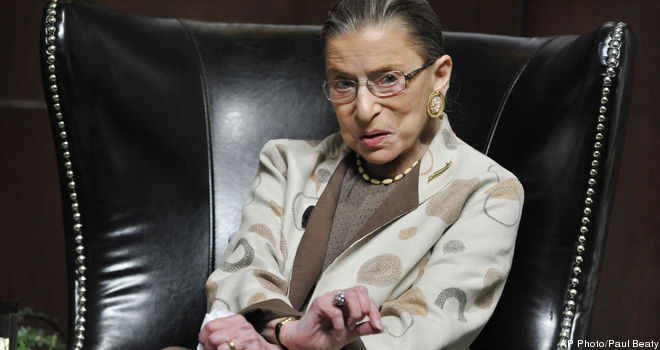Close observers of the legal war over abortion are familiar with the story: Justice Ruth Bader Ginsburg, the leader of the Supreme Court’s liberal wing, is a passionate critic of Roe v. Wade, the landmark ruling that turned 41 on Wednesday.
It’s not that she opposes the holding that recognizes a right to an abortion. It’s that she opposes the logic of the 1973 court’s majority opinion and the constitutional basis under which seven justices arrived at their conclusion.
“Roe isn’t really about the woman’s choice, is it?” the Clinton-appointed justice said last May at the University of Chicago Law School. “It’s about the doctor’s freedom to practice … it wasn’t woman-centered, it was physician-centered.”
Her pique is that the Roe opinion, written by Justice Harry Blackmun, relies on a “right of privacy” under the 4th Amendment and emphasizes the right of physicians to practice medicine as they see fit. She prefers that abortion rights be recognized under the equal protection clause of the 14th Amendment, based on the view that having a child should be a woman’s choice.
Ginsburg has also said that the ruling damaged the growing movement for abortion rights by going “too far, too fast” and catalyzing the conservative pro-life community, which considers Roe a monumental act of judicial overreach. Her words ring truer than ever today as the movement that was then on the decline has since has been successful at unwinding Roe protections in the Supreme Court and at dramatically curtailing abortion rights in red states, potentially nudging the issue back to the justices in the foreseeable future.
“That was my concern, that the court had given opponents of access to abortion a target to aim at relentlessly,” she told students at the University of Chicago Law School, as reported by The Associated Press. “My criticism of Roe is that it seemed to have stopped the momentum that was on the side of change.”
The nature of Ginsburg’s beef with the Roe decision reflects her work as a pioneering legal advocate for gender equality since the 1960s, bringing about important progress for women’s rights. Even so, Ginsburg has voted to uphold the findings under Roe as subsequent abortion cases have come before the Supreme Court during her tenure. An increasingly conservative court has gradually weakened the rights that were recognized in Roe, most notably in 2007 by upholding the federal ban on late-term abortion.
It’s a reminder to reproductive rights activists that 41 years after victory, the sine qua non of their cause hangs in the balance and could conceivably be left to the mercy of the most conservative Supreme Court since the 1930s.






